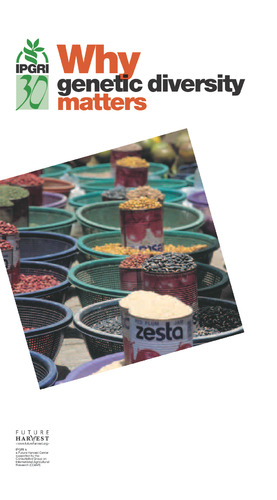Why genetic diversity matters
It is 30 years since IPGRI came into being, as the International Board for Plant Genetic Resources, under the protective wing of the Food and Agriculture Organization of the United Nations. For all that time, regardless of the focus of its work, IPGRI has taken it as axiomatic that agricultural biodiversity is a good thing. In the beginning, it was the vanishing diversity of locally adapted varieties, fundamentally useful to plant breeders in their efforts to improve crops, that IPGRI helped to collect and protect in ex situ genebanks. IPGRI was then among the first to recognize the crucial role that biodiversity, including forest biodiversity, plays in the farming systems for developed and developing countries. By enhancing the value of biodiversity, IPGRI and its partners helped people to conserve and use diversity in situ on farms. Unfortunately, the importance of agricultural biodiversity is still not widely understood, even among fellow scientists. That is why IPGRI was glad to have the opportunity to lead a symposium on 'Why Genetic Diversity Matters' at the 2003 Annual Meeting of the Crop Science Society of America. Six speakers from developed and developing countries and the public and private sectors discussed the role of genetic diversity in agriculture today and its value for the agriculture of tomorrow. Much of what was said was positive and optimistic, although naturally difficulties remain. This booklet gives readers a flavour of the discussion, positive and negative, and makes the case that diversity does indeed matter, now and for the future. As IPGRI moves forward into a new phase we believe that agricultural diversity can make a fundamental contribution to sustainable development. We will have to make full use of it if we are to stand any chance of meeting the key millenium development goals of halving poverty and hunger and protecting the environment in a sustainable manner by the year 2015.

